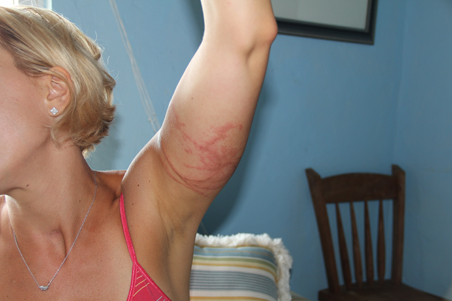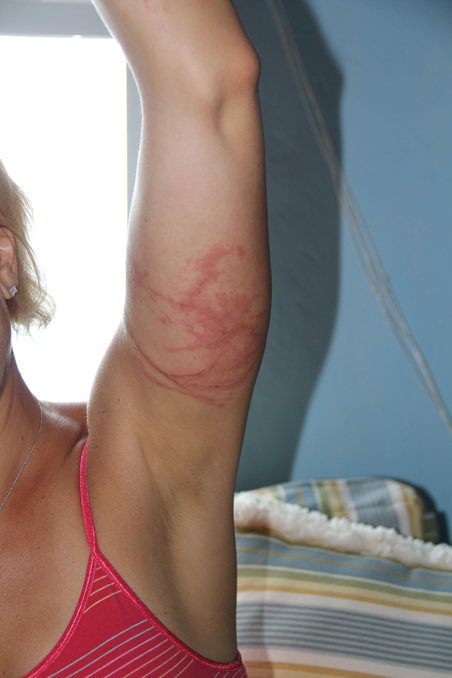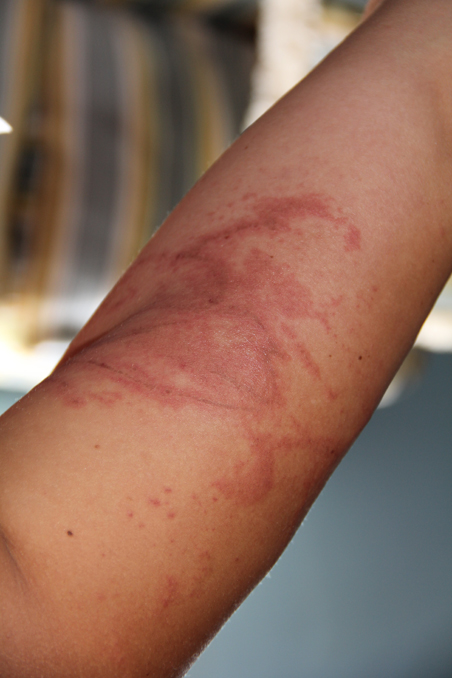PHOTOS: Montco Woman Stung by Most Venomous Creature on Earth
When Diana Nyad slowly rose out of the surf and walked onto the sands of Smathers Beach in Key West, she became the first person in history to swim the 111 miles from Cuba to Florida without the protection of a shark cage. Instead Diana wore a customized silicone mask to protect her from something much more deadly—jellyfish—specifically the box jellyfish, the most venomous creature on earth.
Melanie Zamichieli from Lafayette Hill, Montgomery County, can testify. “It felt like a million razor blades slicing into my skin” is the way Melanie describes what it felt like after a box jellyfish wrapped a tentacle around her body. “I was sure I was going to die.”
It is estimated that 100 people die every year after an encounter with the jellyfish, also called the sea wasp and the marine stinger. It is easily the ocean’s deadliest creature.
Melanie had never heard of a box jellyfish when she and her husband, Jim, planned their “trip of a lifetime” to the British Virgin Islands for the first week of August, when both celebrated their 40th birthdays. The couple travelled with their two sons, 9-year-old J-J and 7-year-old Freddie.
Melanie always wanted to visit the Baths of Virgin Gorda. A chartered boat took the family just off shore of Melanie’s dream. It anchored in crystal-clear shallow water.
The long, deadly tentacles of the Box Jellyfish are crystal clear too. Little Freddie jumped in the water first, then Jim, then Melanie. Thinking back now, Melanie cringes at what might have happened. “Freddie’s tiny body, if it had been, I can’t even think about it.”
She never felt a sting. In fact, quite the opposite, she started to go numb. Melanie said to Jim, “There’s something not right. I can’t feel the left side of my body.” She looked down and saw a tentacle wrapped around her. She pulled it off her, but the venom was already inside. “I started to go into muscular convulsions on the shore.” Jim carried her back to the boat.
During the 10-minute boat ride to Spanish Town, the closest place with a medical facility, Melanie felt her tongue getting bigger. “I thought, if I go into anaphylaxis shock and my throat closes, I’ll die.” An ambulance was waiting on shore, all four got in the back. Through her pain, Melanie tried to comfort her two boys by saying, “Mommy is going to be alright,” but she was not sure she was telling the truth.
She was.
There are still marks where the tentacles released the venom through Melanie’s skin (below). The scars look like a fresh, third-degree burn. Her dermatologist promises they will go away, after he called in other doctors to see the scars. Melanie remembers thinking, “I’m not sure if I’m a celebrity or a freak.”
She was a rarity in this part of the world. The Zamichielis are like most people in North America: They never knew about the box jellyfish before they met one. Why should they? A few have been spotted off Southern California and the eastern shores as far north as North Carolina, but not in the numbers they are in places like Australia, Malaysia or the Philippines, where 20 to 40 people die every year from box jellyfish stings. Signs on beaches there warn bathers of the possibility, and beaches are closed when the monstrous, translucent creature with 24 floating eyes and 45 tentacles is spotted.
The most common jellyfish we encounter off the coast of New Jersey and Delaware beaches is the moon jellyfish. It can cause an unpleasant sting, but are not nearly dangerous to humans, certainly not deadly.
Even though there are only a handful of jellyfish species that can kill a man, there are enough of them so that it’s 15 to 30 more times likely that you’ll be killed by a jellyfish than a shark. It’s just that Steven Spielberg never did a movie about jellyfish, and the Discovery Channel isn’t going to have a “Jellyfish Week” anytime soon.
But Diana Nyad knows, and so does Melanie Zamichieli: You should be much more frightened of a box jellyfish than a shark. After passing out from the pain, some sting victims have continued screaming long after losing consciousness.
Is that scary enough for you?
The only comfort is that it is easy to protect yourself. Wear a wet suit or even nylons, anything that keeps the tentacles from making contact with the skin. It’s that easy.
As Melanie healed at her hotel in the Virgin Islands, she lamented “the trip of a lifetime” that never was. Jim said sweetly, “We can always come back.” Nylons, swim shirts and possibly silicone masks will be on the to-pack list.





